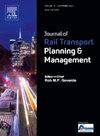铁路维修轨道时间谈判的双层规划与议价博弈方法
IF 2.7
Q3 TRANSPORTATION
Journal of Rail Transport Planning & Management
Pub Date : 2025-10-11
DOI:10.1016/j.jrtpm.2025.100552
引用次数: 0
摘要
铁路维修调度需要严格的计划,以确保所涉及的代理人之间的和谐。这些代理人的作用可能因国而异;然而,基础设施经理通常监督铁路运营,并控制进入铁路网络的维护措施。轨道工程需要避开火车交通的时间,因此,这将是本文的主要讨论点。特别是,基础设施管理人员和维护承诺者之间关于容量分配过程中时间的谈判。谈判时间的不合理是各方目标和责任的结果,也是杠杆不平衡的结果。本文将该场景建模为Stackelberg博弈,并使用双层优化方法解决问题。该模型考虑了影响杠杆作用的因素,例如工作的紧迫性和其他可用选项的质量-例如,外部各方可能能够提供更好的交易,称为谈判协议的最佳替代方案。使用合成数据的工作示例的结果提供了证据,表明由于代理之间的不合作以及纠正性维护而不是预防性维护,存在显着的剩余效用。本文章由计算机程序翻译,如有差异,请以英文原文为准。
A bilevel programming and bargaining game approach to negotiations regarding time on track for railway maintenance
Railway maintenance scheduling requires rigorous planning to ensure harmony between the agents involved. The roles of these agents can vary from country to country; however, the infrastructure manager usually oversees the railway operations and controls access to the railway network for maintenance measures. Trackwork requires time free from train traffic — therefore, this will be the main discussion point of this paper. In particular, the negotiations between infrastructure managers and maintenance undertakers regarding time on track in the capacity allocation process. Irrationality in negotiations for time on track is a consequence of the aims and responsibilities of each agent, as well as imbalance of leverage. This paper models the scenario as a Stackelberg game and solves the problem using methods from bilevel optimisation. The model considers factors that affect leverage, such as the urgency of the works and quality of other available options - e.g. outside parties that may be able to provide a better deal, known as the Best Alternative To a Negotiated Agreement. The results from a worked example using synthetic data provide evidence that there is a significant surplus of utility being left on the table due to non-cooperation between agents, and corrective rather than preventative maintenance.
求助全文
通过发布文献求助,成功后即可免费获取论文全文。
去求助
来源期刊

Journal of Rail Transport Planning & Management
TRANSPORTATION-
CiteScore
7.10
自引率
8.10%
发文量
41
 求助内容:
求助内容: 应助结果提醒方式:
应助结果提醒方式:


